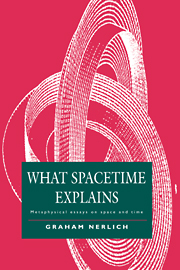10 - Can time be finite?
Published online by Cambridge University Press: 19 October 2009
Summary
Introduction
Time can be finite, surely. Indeed, we might expect that a finite time would be easier to understand than an infinite one, infinity being looked on, popularly, as a concept before which the mind can only recoil in defeat at any attempt to grasp it. But, of course, that is not how things are. The thought that time, if not the world, is somehow infinite has been the dominant (if not the only) idea about cosmic time in our culture. This excepts the dim, remote past and also the present, in specialized circles, at least. We can begin to explain this state of affairs by pointing to the success of Euclidean geometry as a theory of space. Doubtless, it is easier to think of time as infinite if we first grow used to thinking of space as infinite. But we must find more and deeper presuppositions than this if we are to understand fully the sources of conceptual stress which the idea of finite time is apt to produce in us. I hope to identify at least some of these. For much the most part, I will focus on rather primitive sources of confusion which obstruct the thinking of the generalist rather than the specialist, though some examples push the inquiry necessarily closer toward the fringes of cosmology.
My strategy will be to compare and contrast the problems of understanding finite time with those of understanding finite space. I begin with a broad intuitive distinction. Let us divide finite spaces and times, rather roughly, into two sorts which I will call, simply, open and closed.
- Type
- Chapter
- Information
- What Spacetime ExplainsMetaphysical Essays on Space and Time, pp. 230 - 246Publisher: Cambridge University PressPrint publication year: 1994



